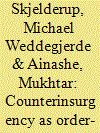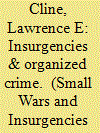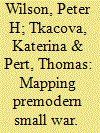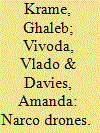|
|
|
Sort Order |
|
|
|
Items / Page
|
|
|
|
|
|
|
| Srl | Item |
| 1 |
ID:
192652


|
|
|
|
|
| Summary/Abstract |
In this paper, we argue that the current insurgency and counterinsurgency discourse is dominated by concepts that are too narrow and too isolated from the wider civil war literature within which insurgency and counterinsurgency occur. Rather than accounting for the complex political processes and wide range of forces and actors that shape conflict dynamics, the dominant insurgency and counterinsurgency debate tends to reduce highly messy contexts to a competition between the often false dichotomy of insurgents and counterinsurgents, usually understood as the state versus one or more non-state violent actors. In order to understand civil war contexts like South-Central Somalia, we argue that orthodox reductionist concepts and assumptions underpinning the dominant insurgency and counterinsurgency discourse provide limited value. Building on recent critical literature, the paper proposes a refined conceptualization. Instead of understanding insurgency and counterinsurgency as peculiar forms of war, strategies, or sets of guerilla tactics, we follow Jaqueline Hazelton’s line of thought, suggesting that insurgency and counterinsurgency are mere elements of a broader process of violent order-making. Thus, insurgency and counterinsurgency are, in our view, comprehensive processes of organized challenge to and consolidation of established political order within the context of civil war.
|
|
|
|
|
|
|
|
|
|
|
|
|
|
|
|
| 2 |
ID:
192648


|
|
|
|
|
| Summary/Abstract |
Operational analysis of irregular warfare typically focuses on politically-based actions (typically violent) against governments. Intelligence services very often base their planning, collection efforts, and analysis on opposing insurgent or terrorist groups, proxy forces, and governments that might be supporting them. A key threat to stability in these complex security environments – organized criminal activities – has rarely received similar attention. Using commonalities revealed by patterns of organized crime in multiple regions as a basis for essential elements of information can provide a template for more comprehensive intelligence support and more sophisticated operational strategies.
|
|
|
|
|
|
|
|
|
|
|
|
|
|
|
|
| 3 |
ID:
192647


|
|
|
|
|
| Summary/Abstract |
The example of the Thirty Years War (1618–48) demonstrates that small war was already integral to the conduct of premodern hostilities. Commanders employed these methods with a purpose and generally tried to limit the accompanying violence to preserve discipline and effectiveness, as well as their claims to be waging a just war. We explain why conventional histories have neglected the presence of small war in premodernity, and show how its importance, methods, and wider impact can be reconstructed through innovative digital mapping techniques, which have the potential to be applied to conflicts in other times and places.
|
|
|
|
|
|
|
|
|
|
|
|
|
|
|
|
| 4 |
ID:
192649


|
|
|
|
|
| Summary/Abstract |
This study examines the evolution of drone tactics employed by drug cartels in Mexico from 2017 to 2022. The research traces the increasing sophistication of drone technology, payload capacities, and adaptability of cartels in employing airborne drones in low-intensity conflicts It also highlights the increasing reliance on drones for various purposes. The analysis reveals insights into how criminal organizations adapt to the changing technological landscape, incorporating drones into their operations and creating new challenges for law enforcement. The analysis outlines strategies and identifies specialized measures to counteract this asymmetric warfare.
|
|
|
|
|
|
|
|
|
|
|
|
|
|
|
|
| 5 |
ID:
192651


|
|
|
|
|
| Summary/Abstract |
The use of agrarian reform within civil war to diminish insurgent support and violence has been a key topic within conflict scholarship, particularly in rural societies. Yet, this research has largely overlooked the ways in which the dynamics of counterinsurgency itself shapes land reform institutions – the procedures governing redistribution and legalization. Focusing on Nicaragua’s Contra War (1980–1990) and its longer-term effects, this article illustrates how counterinsurgent warfare can prompt state elites to refashion the rules of agrarian reform and titling in ways that ultimately undermine the state’s ability to regulate land tenure. As the perceived threat posed by the Contra insurgency deepened and peasant producers defected to rebels’ side, the highly centralized revolutionary coalition in power implemented alternative rules structuring land provision to recover rural support and preserve incumbent political power. These new rules permitted the individual and provisional titling of unregistered parcels, widening the property rights gap. The case thus illustrates that the obstacles to wartime agrarian reform may not emerge from state weakness or incompetence, but from how strategic wartime imperatives perversely remake the rules of land redistribution and titling.
|
|
|
|
|
|
|
|
|
|
|
|
|
|
|
|
| 6 |
ID:
192650


|
|
|
|
|
| Summary/Abstract |
Idris Déby’s counterinsurgency in the Lake Chad Basin (LCB) and the Sahel crafted imaginaries of Déby as a bulwark against terrorism in the region. Existing scholarship argues that Deby's death has accentuated insecurity in the region. The study adopts critical analysis and is anchored in the theory of security regionalism; it argues that the politics of Déby as a regional strongman constricted democratic spaces, invited violent opposition, and sustained rebellion in parts of the region. Although Déby provided occasional pushback when the terrorists inflicted harm on Chadian interests, he would not have won the war against terror unilaterally without regional cooperation.
|
|
|
|
|
|
|
|
|
|
|
|
|
|
|
|
|
|
|
|
|